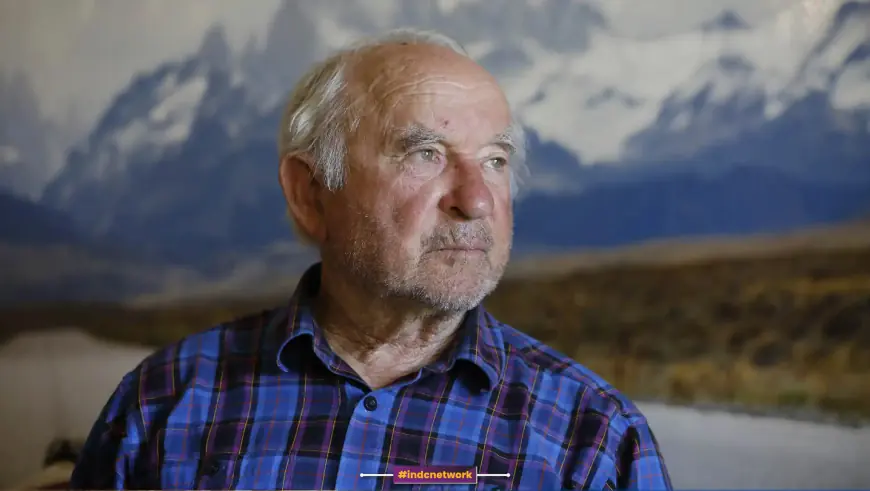How Yvon Chouinard Built Patagonia into a Global Brand While Revolutionizing Sustainable Business Practices
Yvon Chouinard, the founder of Patagonia, turned a small climbing equipment company into one of the world’s most iconic brands. Known for its commitment to environmental sustainability, ethical manufacturing, and social responsibility, Patagonia has become a global leader in green business practices. Chouinard’s personal philosophy and innovative approaches have made Patagonia not just a company but a movement. This article delves into Chouinard's life, the rise of Patagonia, its environmental ethos, and how it continues to challenge traditional corporate norms. Learn about the visionary behind Patagonia’s growth and the lasting impact of his principles on modern business.

INDC Network : Biography : Patagonia: The Journey of Yvon Chouinard from Climber to Global Icon
In a world where environmental degradation and consumerism have become pressing issues, Patagonia stands as a beacon of hope. Founded by Yvon Chouinard, a visionary whose commitment to the planet and its people has reshaped the way we think about business, Patagonia is not just a brand—it is a movement. From humble beginnings as a small climbing gear company to becoming a global leader in sustainable fashion and outdoor gear, Patagonia’s journey is one of resilience, innovation, and purpose.
The story of Patagonia is deeply intertwined with that of Yvon Chouinard, the company’s founder and driving force. Chouinard’s philosophy has always been about more than just making a profit; it’s been about making a difference. By integrating sustainability, ethical production, and activism into the fabric of Patagonia, Chouinard has shown that business can be a powerful force for good. But how did a passionate climber with a love for nature transform his hobby into a world-renowned brand? Let’s dive into the fascinating story of Yvon Chouinard and Patagonia.
Yvon Chouinard: The Early Years and the Birth of Patagonia
Yvon Chouinard was born on November 9, 1938, in Lewiston, Maine. His early life was marked by an inherent love for nature and the outdoors. As a young boy, Chouinard was drawn to the mountains, and by the age of 14, he was already rock climbing in the rugged terrain of California. His early experiences in the wild shaped his passion for conservation and sustainability.
Chouinard’s interest in climbing led him to experiment with making his own climbing gear. In the late 1950s and early 1960s, he started to forge his own iron pitons, a key piece of climbing equipment at the time. These hand-forged pitons were superior to mass-produced versions, as they were lighter and more reliable. His innovations quickly gained traction within the climbing community, and in 1957, Chouinard Equipment, his first company, was born.
However, it wasn’t until the 1970s that Yvon Chouinard’s journey truly evolved into the creation of Patagonia. As Chouinard Equipment continued to grow, the demand for climbing gear skyrocketed. During this period, Chouinard’s interests expanded beyond gear to clothing designed specifically for outdoor adventurers. This was the beginning of Patagonia, a company that would go on to revolutionize both the outdoor clothing industry and the concept of sustainable business.
Patagonia’s Mission: A Commitment to Environmental Responsibility
Patagonia’s foundation was built on the idea that business could be a force for good—if it was done ethically. Chouinard’s vision for Patagonia was to create high-performance gear for climbers, skiers, and outdoor enthusiasts while minimizing the company’s environmental impact. In fact, from its very inception, Patagonia was committed to using recycled materials, sourcing sustainable fabrics, and ensuring that their products were built to last.
The turning point for Patagonia came in the early 1980s, when Chouinard and his team realized the environmental impact of their products and practices. They found that the materials used to make outdoor gear were harming the environment, and this realization prompted the company to rethink its approach. This was the moment when Patagonia embraced sustainability in a way that few companies ever had.
Patagonia became one of the first companies to use organic cotton in its clothing line, and in the years that followed, it continued to innovate in sustainable practices. In 1996, the company began using 100% recycled polyester in some of its products, and by 2008, it became the first company to offer fully recyclable wetsuits made from environmentally friendly materials. Patagonia’s commitment to reducing its carbon footprint, conserving resources, and protecting ecosystems became a central focus of its operations.
One of the company’s most well-known initiatives is the "Worn Wear" program, which encourages customers to buy used Patagonia gear and exchange old items for credit. This initiative reflects Chouinard’s belief in the concept of “buy less, buy better,” which advocates for thoughtful consumption rather than fast, disposable fashion.
The Role of Innovation: Pioneering Sustainable Materials
Yvon Chouinard’s vision extended beyond just ethical production; he sought to challenge the entire paradigm of consumption. In the 1990s, Patagonia pioneered the use of environmentally friendly materials in its products, focusing on reducing the use of harmful chemicals, plastics, and synthetic fibers.
One of the company’s most notable achievements was its development of “H2No” fabric, a waterproof, breathable fabric made from recyclable polyester. Patagonia also introduced the “Better Sweater” line, which uses recycled polyester instead of virgin polyester. The company also became known for its use of hemp in clothing, recognizing its low environmental impact and durable properties. These innovative materials not only helped Patagonia reduce its environmental footprint but also inspired other companies to follow suit.
Patagonia’s dedication to finding alternatives to conventional materials also extended to its supply chain. In 2005, Patagonia partnered with the textile mill called “Texworld” to create a more sustainable supply chain for its products. This partnership allowed the company to track the environmental impact of each step in the production process and ensure that every product it sold was made in the most environmentally responsible way possible.
Corporate Activism: Patagonia's Bold Stance on Environmental Issues
Patagonia is perhaps best known not only for its sustainable products but for its corporate activism. Yvon Chouinard has long been a vocal advocate for environmental causes, and under his leadership, Patagonia has consistently taken bold stands on political and environmental issues.
In 2011, Patagonia launched its now-famous “Don’t Buy This Jacket” campaign, urging customers to consider the environmental impact of their purchases. The company encouraged consumers to reduce waste, repair their old gear, and think about the long-term implications of overconsumption. This campaign, which ran during Black Friday, was a radical departure from typical consumer-driven marketing strategies. Patagonia’s message was clear: profit was secondary to environmental responsibility.
In 2017, Patagonia took another significant step by suing the Trump administration over its decision to reduce the size of national monuments in Utah. The company argued that the decision threatened protected public lands and the environment. Patagonia’s activism has resonated deeply with its customers, many of whom appreciate the company’s unwavering commitment to protecting the planet.
Patagonia’s environmental efforts have earned it accolades, including recognition as a certified B Corp, a designation given to companies that meet the highest standards of social and environmental performance. The company has also donated a significant portion of its profits to environmental causes, with $10 million of tax cuts in 2018 alone going to environmental nonprofits.
Patagonia’s Culture: The Employee-Focused Workplace
Another element that sets Patagonia apart is its commitment to creating an employee-friendly workplace. Chouinard has always emphasized the importance of a healthy work-life balance, and Patagonia has developed policies that reflect this. The company offers flexible working hours, on-site childcare, and even paid time off for employees to engage in environmental activism.
Patagonia’s culture of responsibility extends to its employees as well, encouraging them to lead lives that align with the company’s values. The company has a strong focus on community involvement, and many of its employees are actively engaged in environmental activism. In fact, Patagonia has been known to hire people who share a passion for environmental issues and who are eager to use their positions to advocate for the planet.
Patagonia's Legacy: A New Model for Business
Yvon Chouinard’s influence on Patagonia and the business world at large is undeniable. His commitment to sustainability, activism, and social responsibility has set a new standard for what a company can achieve. Patagonia has proven that it is possible to build a profitable business while staying true to one’s values. The company has shown that the pursuit of profit need not come at the expense of the planet, and its success has inspired countless other businesses to adopt sustainable practices.
Chouinard’s leadership has created a lasting legacy that will continue to shape the future of business. By proving that ethical production, environmental stewardship, and corporate activism can go hand in hand, Patagonia has redefined what it means to be a responsible company. As the world continues to face environmental challenges, Patagonia’s pioneering approach will serve as a guiding light for companies looking to make a positive impact.
What's Your Reaction?














































































































































































